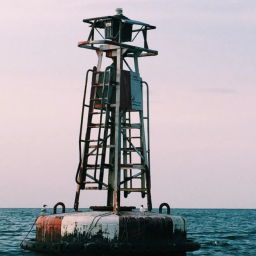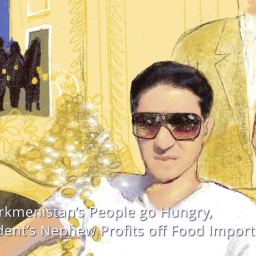Google translated
One does not have a website, and the other failed to get through, but it is these foreign firms that trade in the products of the leading enterprises of the oil and chemical industries of Turkmenistan.
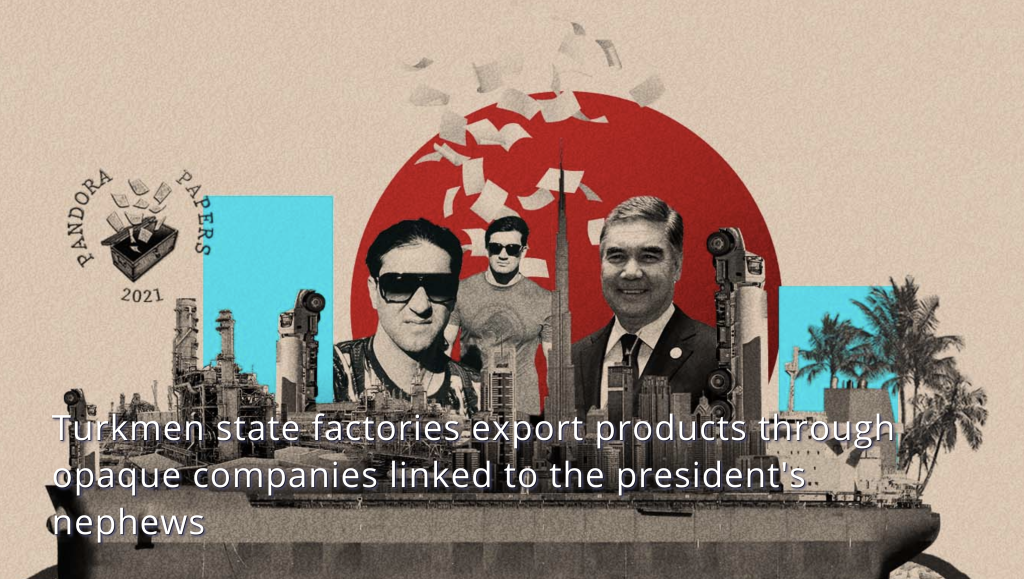
In September 2018, Turkmenistan celebrated an important industrial achievement of the country – the launch of a new state-owned urea plant in the city of Garabogaz on the coast of the Caspian Sea. The media wrote that even foreign diplomats from Ashgabat attended the grand opening.
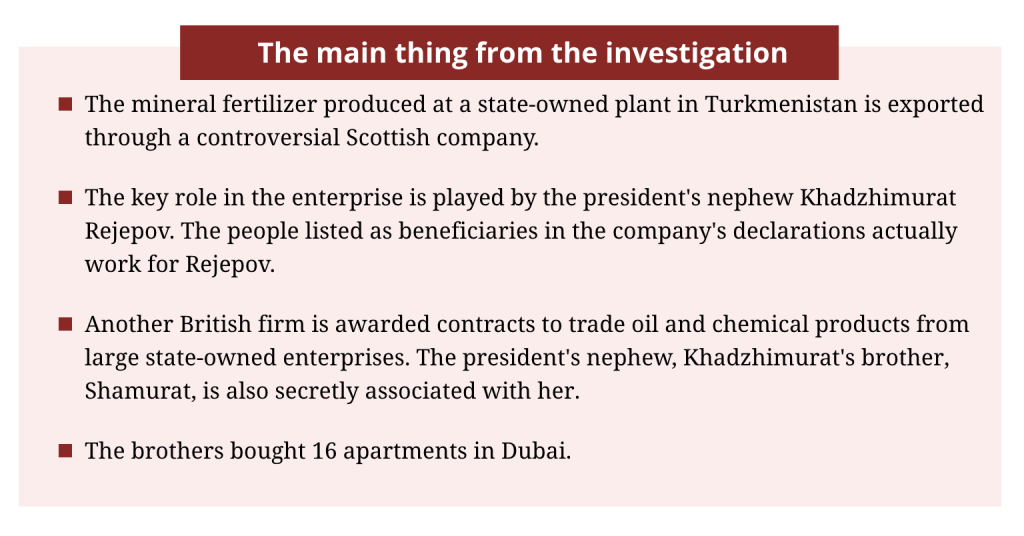
The Garabogazkarbamide plant, for the construction of which the Japanese Bank for International Cooperation (JBIC) issued a loan of $ 1.16 billion, has significantly increased the capacity of Turkmenistan in the production of urea fertilizer, one of the country’s key export products.
A new investigation by OCCRP and partners, Turkmen.News and Gundogar.org, reveals that among the main exporters of the urea produced at the plant was a dubious Scottish company that does not even have a website.Photo: Khadzhimurat Rejepov / InstagramKhadzhimurat Rejepov (left) with his brother Shamurat
Moreover, although the shareholders and ultimate beneficiaries of the firm changed several times, in fact, the company was secretly controlled by Khadzhimurat Rejepov, the nephew of Turkmen President Gurbanguly Berdimuhamedov.
The investigation builds on the Pandora Archive , the leaked millions of documents from offshore corporate service providers that the International Consortium of Investigative Journalists (ICIJ) has shared with partners.
Khadzhimurat is not the only Rejepov in the leaked documents. Apparently, his younger brother Shamurat used a similar scheme and played a similar role in a British company that calls itself the leading exporter of petroleum products at a large Turkmen oil refinery (refinery).
The leaked documents contain interesting information about the beneficiaries of the companies: their shareholders were offshore “denominations”, which were used to hide the real owners. Since the UK began requiring disclosures about “persons with significant control” in the enterprise, several little-known Turkmen citizens have appeared in the declarations. Those who OCCRP reporters were able to contact declined to comment.How Khadzhimurat profited from starving TurkmensIn May, OCCRP and partners revealed how Khadzhimurat Rejepov made money on a lucrative government contract to import food for hungry citizens of Turkmenistan.Read more
Ties with the elite allow the Rejepov brothers to live a completely different life than most citizens of Turkmenistan, which human rights activists call one of the most authoritarian countries in the world. President Berdymukhamedov oversees almost every aspect of political life and economy, including the approval of bank card designs and medals for dog shows.
Turkmenistan does not publish government documents in the public domain, and they have not heard of freedom of the press here. This makes it extremely difficult for independent journalists and civil society to find out what is happening in the country.
Khadzhimurat and Shamurat Rejepov, as well as representatives of President Berdymukhamedov’s administration, did not respond to requests for comment.
Import and export
The new state-owned urea plant has made Turkmenistan the region’s leading fertilizer exporter: according to documents from the UN Comtrade database for 2019 and 2020, the country exported over 1.6 million tonnes of urea.
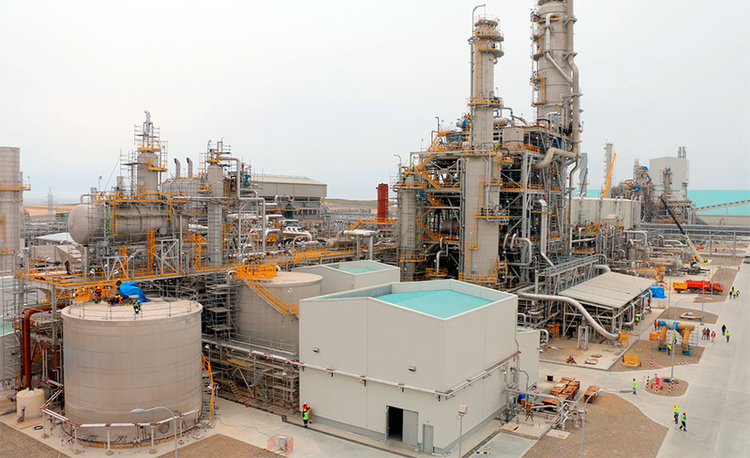
There is no publicly available trade data revealing how important the Scottish company Caran Holdings was in this. However, various sources indicate that she got a large piece of the pie.
In 2018, a man who identified himself as Caran’s representative at the new plant was interviewed by the government newspaper Turkmenistan. He said the company signed an agreement to export 1.2 million tons of urea produced at the plant through Georgian and Russian ports.
He also said that the company has agreed with a state firm to buy 200,000 tons of fertilizer, which they planned to sell to China, India, Egypt and several African countries.
If this is true, then the company is the only fertilizer exporter from Turkmenistan. (However, the information in Comtrade may be incomplete.)
Several independent sources also cite the firm as a major player in the market.
Argus Media, which provides information on prices for energy and other goods based on data from the government of Turkmenistan, called Caran “the largest supplier of Turkmen urea by river routes this year.”
The journalists also got documents containing Caran sales statistics. In 2020, the firm sold 213,000 tonnes of urea to a Russian trading company, which transferred the goods to US buyers.
An industry source also said the company regularly exports tens of thousands of tons of fertilizer. He agreed to speak with reporters on condition of anonymity and provided several dozen invoices in support of his words.
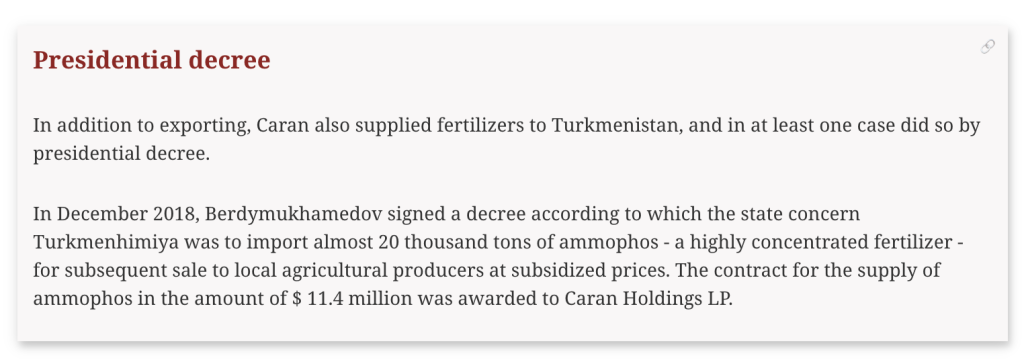
Scottish secrets
The president’s nephew, Khadzhimurat Rejepov, is the only notable person in the Caran documents. He was listed as the owner of the company from January to November 2020.The power of attorney issued in 2019 gave Rejepov the right to “make payments, control, modify and execute any business contracts and issues … related to the company’s activities and affairs.”
This fact is difficult to explain: if they wanted to hide his involvement in the company, then it was most likely a mistake. The journalists found out that all other actions during the existence of the company were aimed at avoiding his exposure.
Apart from those nine months, on paper, the owners of the company have always been hired lawyers or offshore firms – this is a typical way to hide the true owners of a business.
Despite the fact that since 2017 the UK has required companies like Caran to to provide information about “persons with significant control” – this is the way the real beneficiaries are identified in the country – Rejepova was not indicated in the documents of the company.
However, there is other evidence that he played an important role in Caran. First of all, two sources who worked with Rejepov, who asked not to disclose their names for security reasons, said that it was he who actually controlled the company.
This is also confirmed by documents from the “Pandora’s Archive”. His name appears in two powers of attorney for the management of the company dating from different years: one document is a draft, and the second is signed and sealed. The first was prepared in December 2018, a few months after the opening of the plant.
The journalists also found out that two more people, who are listed as “persons with significant control” in Caran’s documents, worked for Rejepov.
Among them was Kerimberdy Yalkabov, who, like Rejepov, received a “power of attorney” to manage the firm. The journalists recognized Yalkabov’s phone number and checked it through GetContact, an application that displays how the owner of the number is recorded in other people’s address books. He has been referred to several times as an “employee” or “assistant” to Haji (Khadzhimurat’s nickname), as well as a representative of Caran Holdings.
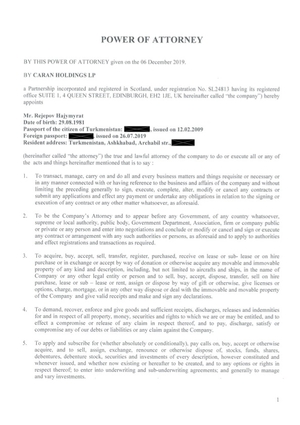
In 2019, the publication “Business Turkmenistan” published photographs from the international exhibition “Oil and Gas of Turkmenistan – 2019” held in Ashgabat. The Caran logo is also visible in the photo of the Ak Khazyna stand.
The second person was Gulnar Charyarova, who is listed on the bill of lading as the chief accountant of the Ak Khazyna company . It follows from the documents that this Turkmen company was the representative of Caran in the country. It was she who bought urea at the state commodity and raw materials exchange of Turkmenistan, and then transferred it to Caran for subsequent export. (Turkmenistan does not publish corporate data publicly, however, in the documents that have come to the disposal of journalists, Rejepov is listed as the director of the enterprise.)
Finally, since 2019, Rejepov has been listed as the sole shareholder, and since 2020, the director of Caran Holdings Limited, a Hong Kong company of the same name. This is confirmed by data from the local corporate register. The journalists were unable to find out if this company is engaged in any commercial activity.
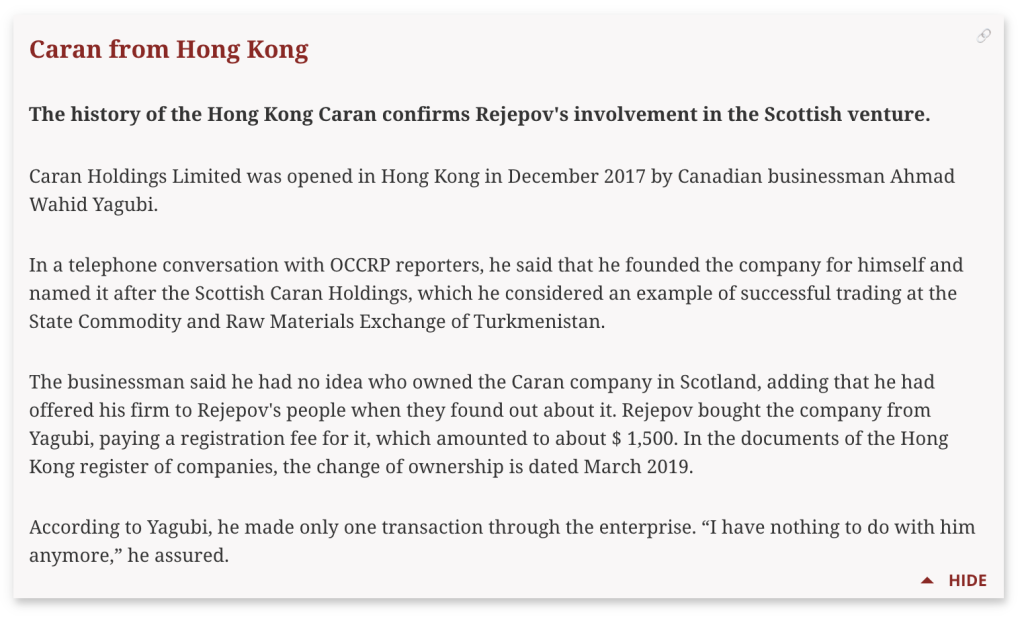
Oil and gas
Caran, controlled by Khadzhimurat, bought and sold fertilizers, and his younger brother Shamurat was apparently associated with the Delanore company, which sells products of the Turkmen chemical industry and petroleum products produced by state-owned enterprises of the oil and gas sector of Turkmenistan.
Although the company’s website says that it is “the leading exporter / importer of petroleum products in the Middle East and CIS countries,” it was created in strict secrecy.
The company was founded in the UK in 2015 by a citizen of the Seychelles, and its subsequent owners were clear “face values”.
In publicly available documents, the name of Shamurat Rejepov was never mentioned in connection with this company. As in the case of Caran, even in the internal files of Delanore, which were at the disposal of journalists, the beneficial owners were non-public citizens of Turkmenistan, about whose activities nothing is known.
However, the Pandora’s Archive contained a signed and sealed power of attorney that the company issued to Shamurat Rejepov in February 2020 – the same document his brother received from Caran.
It is not known why Shamurat needed this document, which was valid for only eight months. However, at the end of this period, Delanore, apparently, began a new stage: Turkish citizen Asie Jeren Chap became the owner and director of the company.
Its appearance marked the expansion of the company: that year, another Delanore was opened in Turkey, which also belonged to Chap. The Delanore Group’s new website says the company supplies food, petroleum products and other goods. It also lists affiliated firms of the same name in the UAE, Turkmenistan and the UK.
Chap herself is not considered a well-known figure in business, however, when she got married, she ended up in the family of Muhammet Chap, a Turkish businessman whose construction company carried out government contracts in Turkmenistan in the 2000s.
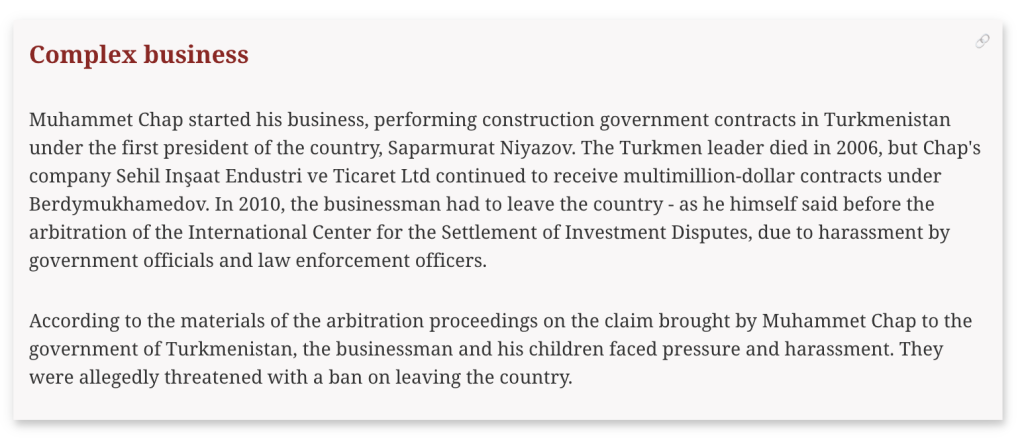
Muhammet Chap started his business, performing construction government contracts in Turkmenistan under the first president of the country, Saparmurat Niyazov. The Turkmen leader died in 2006, but Chap’s company Sehil Inşaat Endustri ve Ticaret Ltd continued to receive multimillion-dollar contracts under Berdymukhamedov. In 2010, the businessman had to leave the country – as he himself said before the arbitration of the International Center for the Settlement of Investment Disputes, due to harassment by government officials and law enforcement officers.
According to the materials of the arbitration proceedings on the claim brought by Muhammet Chap to the government of Turkmenistan, the businessman and his children faced pressure and harassment. They were allegedly threatened with a ban on leaving the country.
It is not known whether Shamurat Rejepov was involved in the new, larger Delanore structure. Neither he nor Asia Jeren Chap spoke to reporters. Another woman from Turkmenistan, who is listed in the documents as a shareholder of the British Delanore, as well as her son, who has the status of a “person with significant control”, declined to comment. Delanore’s UK and Dubai offices could not be contacted.
However, the scale of the company’s operations in Turkmenistan (the website says it imports and exports a variety of goods from the country) suggests that someone with connections and influence is helping it in Ashgabat.
Several leads lead to Shamurat Rejepov.
The journalists called Delanore’s office in Ashgabat. The person who answered the phone said it was Ak Rovach, which represents Delanore in Turkmenistan. According to him, regarding the purchase of oil products, one should contact his “boss”, Dovran Niyazov.Photo: Ibabekir Bekdurdyev / InstagramShamurat Rejepov (center) and Ukkashe Chap (right) rest on a private yacht
The Pandora Archives discloses that Niyazov had a power of attorney to run Britain’s Delanore, which was in effect at about the same time as Rejepov. Moreover, journalists checked his number through GetContact and found several evidence of his involvement in Delanore, Shamurat Rejepov and the oil business.
Niyazov refused to speak to reporters.
Despite the fact that things were not easy for the Chap family in Turkmenistan, Rejepov communicates with one of its members: in the photo on Instagram we see him on a private yacht in Turkey with Ukkash Chap, one of the sons of Muhammet Chap.
Nephews in Dubai
It is not known how much Khadzhimurat and Shamurat Rejepovs earned by exporting urea and oil products from Turkmenistan. Nevertheless, their condition can be judged by real estate in the UAE.
Khadzhimurat Rejepov has nine apartments in five residential complexes: Sparkle Tower 2, Damac Heights, Sadaf 4, TFG Marina, where the Wyndham Hotel is located, and Matrix Tower, according to the leak of data from the register of real estate owners in Dubai provided by the research organization C4ADS to OCCRP.
Shamurat owns seven apartments in Sparkle Tower 2, Damac Heights and TFG Marina.
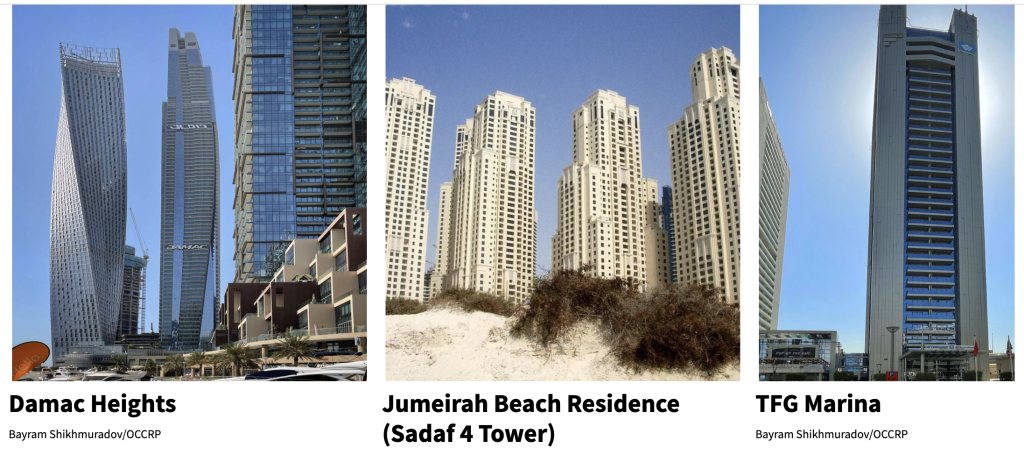
All except the Matrix Tower are located in the prestigious Dubai Marina, near the famous Palm Jumeirah artificial archipelago. Shamurat owns seven apartments in Sparkle, Damac Heights and TFG Marina Hotel.
The leaked files do not indicate the date of purchase, but judging by when the information was entered into the database, the property was acquired after 2018 – around the time when Caran and Delanore were more active.
Comparing the 16 apartments of the Rejepovs with similar apartments in these complexes, which are now for sale, journalists from OCCRP and partners estimated the brothers’ real estate at about $ 5.5 million.
OCCRP by Ruslan Myatiev, Matthew Kupfer and Bayram Shikhmuradov
